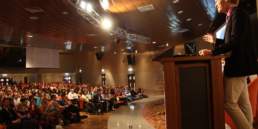Three years ago, the Jasmin Revolution in Tunisia started the Arab Spring, which changed a whole region. From 11th till 18th of May, a group of AEGEE members has the chance to visit Tunisia in the framework of the EuroArab project, to get to know country and culture, people and society – and to understand the region like no tourist can. Until 10th of February AEGEE members can still apply for this unique event, which costs only 140 Euro. The Golden Times spoke with Stephanie “Steffi” Müller and Mariem Ben Ltaifa, the two main organisers of this event, who are at the same time project team members of the EuroArab project.
Golden Times: Steffi and Mariem, Can you tell a few words about yourself?
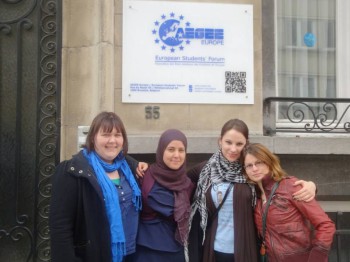
Steffi Müller: I am Steffi from AEGEE-Heidelberg, within the AEGEE network I have done different projects, like being in the core team of Agora Rhein-Neckar and editor-in-chief of the AEGEEan for 1.5 years. Around one and a half years ago I joined the EuroArab team as Financial Manager of the project. Now a very cool project lies ahead of us. The first AEGEE event in Tunisia!
Mariem Ben Ltaifa: I am one of the ambitious youth who want to make a change in their society. I love discovering new cultures and knowing different people. With a strong belief that youth are the key for a better development, I am giving all my efforts and most of my time to encourage people to move, to learn and to experience new things in life in order to improve their future. As an open Arab girl, I know very well how both of Europeans and Arab think of each other, and I believe that it is our role as youth to fight prejudices and stereotypes and reveal the truth for both sides. With many obstacles, our mission seems hard to be realized, but I believe that challenges make us stronger, and we will make our goal become true.
Golden Times: Steffi, why shouldn’t people miss out the chance to apply for the Euroarab event “AEGEE goes to Tunisia”?
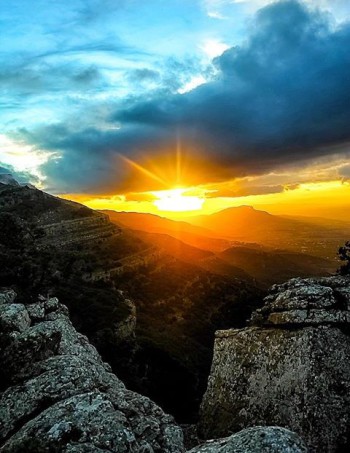
Steffi: People should not miss the chance to apply because it is a once-in-a-lifetime chance to go to Tunis with your AEGEE friends. The programme is amazing! The focus lies on discovering the particular Tunisian culture and in which way it differs from other Arab countries. Maybe you know that Tunisia is the most liberal Arab country. The participants will have the chance to meet Tunisian students from our partner organization and get first-hand information on what happened during the Arab Spring and what happens in the country now politically and in the society. Plus Tunisia is blessed by historic sites and monuments starting from the early Roman times. We will visit a few remarkable places to get a taste of the history of the country. Moreover, while people in Northern Europe might still be freezing, pleasant 30 degrees and guaranteed sunshine is waiting for the participants! I think these are plenty enough reasons why people should apply!
Golden Times: Mariem, you are from Tunisia. How did you get involved in this project? And what’s your role in organizing this event?

Mariem: When the EuroArab project of AEGEE started, they were looking for Arab responsibles, I applied for the HR position. Actually, I’m the only Arab responsible in the team that didn’t quit its position since 2012. In order to promote our project more, we got the idea of the event in Tunisia and I was so excited about it because I’ve always wanted to introduce my country to the world and deny the stereotypes and the prejudices that some people may have for different reasons. I’m the leader of the project in Tunisia and the coordinator between the EuroArab Team and my Tunisian organization that will help to organize the project. In addition, I’m in contact with the different NGOs that will get involved during our event – with different interest: women rights, education, culture and traditions… I am also in charge of coordinating with the institutes, historical places and traditional and religious establishment that we will visit.
Golden Times: Mariem, the event is incredibly cheap: only 140 Euro for one week programme. How is that possible?
Mariem: In order to encourage people to come and see different sides of the world, we wanted to fix a small fee. Before that, we did our best in contacting many different organizations in Tunisia that may help us. Indeed we succeeded to convince an important National Training Agency of the crucial role that this project will play for both European and Tunisian sides.
Golden Times: What will the AEGEE participants see during this event? Can you tell some programme highlights?
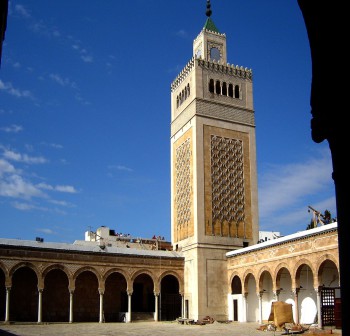
Mariem: Sure. The project programme includes activities exploring both the modern and conservative sides of Tunisia. We will have meetings with Tunisian young people from different NGOs to find out more about their work – these are for example student NGOs and women’s NGOs. Furthermore, we will have discussions about the Tunisian revolution and the Arab Spring: the challenges, the advantages and the obstacles. In addition, we will visit religious and historic sites, such as mosques, cathedrals and museums. And finally, there will be cultural activities to discover Tunisian flavours, costumes, music and traditions.
Golden Times: What will surprise the European participants most in your opinion?
Mariem: I believe that what will surprise Europeans the most is the magical combination of the Tunisian lifestyle that melts modernism and conservatism in the same pot. Nowadays people don’t think that the two styles match together, but in fact in Tunisia they do! Tunisian people have never abandoned their traditions and practice them till now, but at the same time they follow the modern lifestyle in different fields, unlike people in many other countries. I also believe that the participants may have their own ideas about Arab countries, perhaps with some prejudices. I am sure they will be amazed with what I’d like to call “discovery”.
Golden Times: Steffi, this event is part of the EuroArab project. What makes it special, is the fact that AEGEE members actually travel to a Northern African country. In the framework of the project, how many events actually take place in Northern Africa?
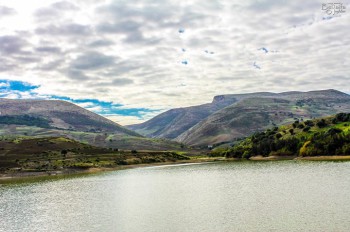
Steffi: The Tunisian event is the first of this kind, and if it works well, there might be more in other Arab countries. For instance, I am also in contact with an Algerian organization, but the political situation in Northern Africa is not predictable. So I cannot give a guarantee that there will be more events in Northern Africa. In Arabic you say “inshallah”. So I say “inshallah” there will be more events in Northern Africa with the EuroArab project!
Golden Times: Why did you choose Tunisia as destination for the first event in Northern Africa?
Steffi: We chose Tunisia, because Mariem is in our EuroArab team and from Tunisia. We thought it would be the best to start organizing events in Arab countries in which we have some team members we can work with. As you know most of the work has to be done by the local team and without having anyone in Tunisia this event would not be possible. Also, we had a EuroArab team meeting in October last year in the AEGEE-Europe headoffice and Mariem just came from Tunis for this extended weekend. There the idea of the event was born, as she luckily loved the idea to organize an AEGEE event in her home country!
Golden Times: Mariem, the Arab Spring started in Tunisia three years ago. It brought lots of changes in the region, but also unrest. With benefit of hindsight, was the Arab Spring necessary? Was it successful? Did it change things for the better?
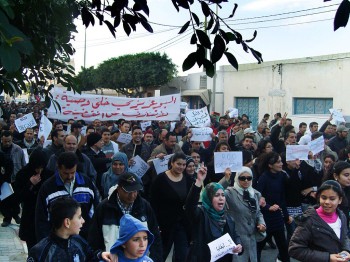
Mariem: I’m personally so proud of being Tunisian, of the fact that we were starting the sparkle of the Arab Spring and dared to speak out loud when many others were hiding – this is really something huge. And in spite of all the difficulties and the challenges that the Arab Spring has caused, I strongly believe that it was necessary. A human being can’t have a decent life without his rights, such as freedom, democracy, citizenship, dignity – and that was the motive of the Tunisian Youth to start the revolution. Things are definitely better than before, in spite of the obstacles that we face now. In addition, I don’t think it’s reasonable to measure the impact of the revolution in only three years. People should be patient because it is totally normal that after any crucial change there will be challenges. I personally think that it is worth it. When I see the media is free to express and to criticize, when I see people go to vote, when I see a new constitution is written… that is worth it indeed!
Golden Times: It looks like that in Tunisia the year started with positive changes. A new constitution is bringing more civil rights and democracy. What do you think about it? And which steps should follow now in Tunisia?
Steffi: Personally, I am very happy about this good news! I hope it will bring peace and stability to the country. Furthermore, I truly hope Tunisia will once again serve as a role model for the other Arab countries.
Mariem: The moment of finishing writing the constitution was a very important and touching moment for the Tunisian nation. It makes us feel that all our sacrifices and the hard time we’ve been through was worth it and that we’re on the good way, unlike other countries after their revolutions. I strongly believe that the Tunisian people won’t stop at this level, because we are eager for progress. I think that after insuring the civil rights, we should focus on the employability issue that was definitely one of the motives of the revolution. And also, to get the Tunisian youth in the public sphere, integrate them in the decision-making process and believe in them – there will be a huge difference in the nation.
Related Posts
1st August 2019
The Gallery of All Presidents of AEGEE-Europe
Here is the gallery of all Presidents of AEGEE-Europe - with photos of every one of them. Enjoy the list!

